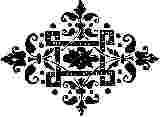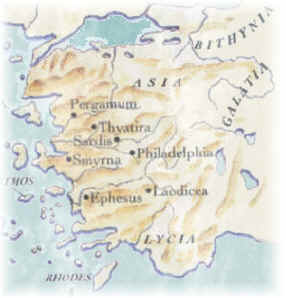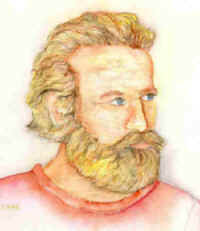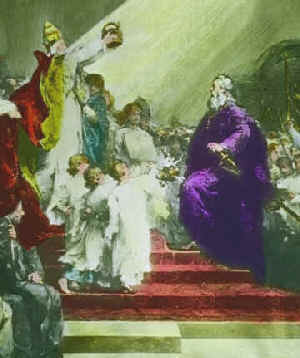
| 1 |
2 |
3 |
4 |
5 |
6 |
7 |
| Ephesus |
Smyrna |
Pergamos |
Thyatira |
Sardis |
Philadelphia |
Laodicea |
| "First,
Desirable" |
"Bitter
Affliction" |
"Earthly
Heighth" |
"Sacrifice
of Labor" |
"Prince
of Joy" |
"Love
of A Brother" |
"Just
People" |
| 33-70
AD |
70-313 |
313-1157 |
1157-1367 |
1367-1517 |
1517-1874 |
1874-? |
Paul
35-64 AD |
John
70-100 |
Arius
313-336 |
Waldo
1157-1217 |
Wycliffe
1367-1384 |
Luther
1517-1546 |
Russell
1874-1916 |
| 7
Golden Candlesticks |
First
& Last,
Dead and Alive |
Sharp
2-Edged Sword |
Eyes
like Fire,
Feet like Brass |
Livest
and Art Dead |
Key
of David |
Amen,
Faithful and True
Beginning of Creation |
| Left
1st Love |
Synagogue
of Satan |
Antipas |
Jezebel |
Come
as Thief |
Hast
Little Strength |
Lukewarm |
| Nicolaitanes |
Tribulation
10 Days |
Balaam
& Balac,
Nicolaitanes |
Depths
of Satan |
Defiled
Garments |
Keep
from Hour of Temptation,
Hold Fast Crown |
Gold
Tried, White Raiment Eyesalve,
Knock at Door,
Sup with Him |
| Tree
of Life |
Crown
of Life,
Not Hurt of 2nd Death |
Hidden
Manna
White Stone, New Name |
Rod
of Iron,
Potter's Vessel
Morning Star |
White
Raiment,
Confess Name to Father |
Pillar
in Temple,
Name of God, New Jerusalem, & New Name |
Sit
in Christ's Throne |
For more detail, click on
individual Church name.

Church of Pergamos
Revelation 2:12-16
Roughly from CE 313-1160.
Pergamos, according to Dr. Young, was
"A celebrated city of Mysia, near the river Caicus." Here parchment was first
perfected and a library of 200,000 volumes formed, which was eventually sent to
Alexandria.
Pergamos also had a famous temple of Esculapius, who was represented
under the figure of a serpent. Clearly it was elevated intellectually over other places,
but as the Revelator observes:
"I know thy works, and where thou dwellest, even where
Satan’s seat is: and thou holdest fast my name, and hast not denied my faith, even in
those days wherein Antipas was my faithful martyr, who was slain among you, where Satan dwelleth." Revelation 2:13

The Seven Churches
|
Arius is commonly believed to be the messenger of this era.
Until this period of time there was enough respect for the apostles,
and especially for John, to keep some semblance of Christianity in the leadership.
However, when Constantine took over the church and made Christianity
the religion of the empire, persecuted Christianity was lifted from the scaffold to the
throne.
Only two bishops voted with Arius against the Athanasian heresy.
Not that the bishops who voted for it truly believed in Athanasius' arguments, but they
trivialized the meaning of their vote to curry the emperor's good graces. This set the
stage for the demise of the doctrine of Christ.
For his faithful stand against the Nicene Creed, Arius and two other
bishops were banished.
|

Arius (c. 250-336 A.D.)
"Undaunted, Arius composed a rival creed to that of Nicea which so impressed
Constantine that he was recalled. But on the very day of his installation ceremony in
Constantinople, Arius died suddenly under suspicious circumstances, leading his friends to
suspect he had been poisoned."
(The Seven Churches
of Revelation, by Charles F. Redeker, 1989, p. 12.) |
The stakes were high. Once bishops tasted the
sweetness of power they were not going to let anything threaten the gains they had secured
with Constantine. It is strange how so-called Christians have shamelessly done so many
vicious and evil things in flagrant violation of the Christian law of "love."
Arius defended the truth on the nature of God and
Christ. He also stood against the ascending aspiration of the bishops to become
enthroned, refusing, as he did, the Episcopal throne of Alexandria. His learned and
blameless Christian lifestyle made Arius an example to the flock, and even his enemies
could not fault him in this area.
Fittingly, the temple of Esculapius, employing the figure of a serpent,
indicated this was Satan’s dwelling place and that he was capable of using his false
apostles to martyr Arius.
Generally, Satan is the prince of darkness but when he wishes to cast
himself into an angel of light he can prepare conditions to grind out 200,000 volumes of
learning as at Pergamos. All kinds of information were generated here to make the Gospel
less distinctive.
"And to the angel of the church in Pergamos write; These things
saith he which hath the sharp sword with two edges."
Revelation 2:12
Here was a powerful reminder to Arius and all the
faithful to stand squarely with the One with the "sharp sword with two
edges"—the Old and New Testaments. It is significant that the Nicene debates
centered on the Word of God concerning the nature of Christ.
It should have been an easy victory for the truth because
Constantine was not the least qualified to determine the Scriptural weight of arguments
presented. The Athanasian double-speak seemed the best route for Constantine to side with
because it provided a foggy philosophical explanation that even pagans might find trouble
understanding and even more trouble in refuting.
There sometimes are advantages to a lack of clarity. The legal
profession makes much use of foggy contracts that the average person simply surrenders and
signs on the dotted line, hoping for the best, later learning some bitter lessons.
"I know thy works, and where thou
dwellest, even where Satan’s seat is: and thou holdest fast my name,
and hast not denied my faith, even in those days wherein Antipas was my
faithful martyr, who was slain among you, where Satan dwelleth."
"But I have a few things against thee, because thou hast
there them that hold the doctrine of Balaam, who taught Balac to
cast a stumblingblock before the children of Israel, to eat things
sacrificed unto idols, and to commit fornication.
"So hast thou also them that hold the doctrine of the
Nicolaitanes, which thing I hate.
"Repent; or else I will come unto thee quickly, and
will fight against them with the sword of my mouth." Revelation
2:13-16
Despite the efforts of the faithful to resist the rising
aspirations of those who wanted central power invested in an earthly head, the pope, the
tide was coming in and their efforts could not prevent the antichrist influence.
Additionally, there were two other forces at work.
First, the doctrine of Balaam was a calculated
endeavor to seduce God’s people into false worship so
that God would punish them.
Second, the doctrine of the Nicolaitanes, the
tendency to wrest the power from the congregations and centralize it with the bishops.
The clergy and laity here emerged and the churches no longer were
autonomous. They now were controlled by bishops, by councils and synods, and by the
devil himself. Yes, the devil crowned the winner pope.
It is during this period that the antichrist arose and established
itself in power. First, it crushed the truth and turned Christianity into a central
religious ruling authority. Following this, the false church, under Pope Leo III, crowned
Charlemagne the "Roman Emperor" in CE 800. There began the long and terrible
reign of the Holy (?) Roman Empire. The noonday of the papal reign was the midnight of the
world.

Pope Leo III crowns Charlemagne
|
The message to this church was
to "repent." How difficult that would prove
to be when the church was having
unparalleled success in centralizing power within and being accepted by the world as the
queen of the civil powers. Before the antichrist lay an open road to power and riches and
glory.
None of this was conducive to repenting of their sins. All the
corrective mechanisms God had placed within the church had long since been destroyed. No
deception is stronger than self-deception. Here the church viewed its great rise to power
and glory as evidence that Heaven was smiling upon them. The delusion was complete.
Click to go to the following:
 For more information on
history of Papacy.
For more information on
history of Papacy.
Topical Studies on:
7 Churches Topical Study Home Page
Ephesus - Smyrna - Pergamos - Thyatira - Sardis - Philadelphia - Laodicea
Chapter/Verse by Verse Studies on:
7 Churches Verse by Verse Home Page
Ephesus - Smyrna - Pergamos - Thyatira - Sardis - Philadelphia - Laodicea
Topical Study Home Page - Chapter Study Home Page
- Sinaitic Manuscript - Questions - Glossary.
E-Mail
Day7000@sbcglobal.net with comments.
Copyright 2001 John Class
|